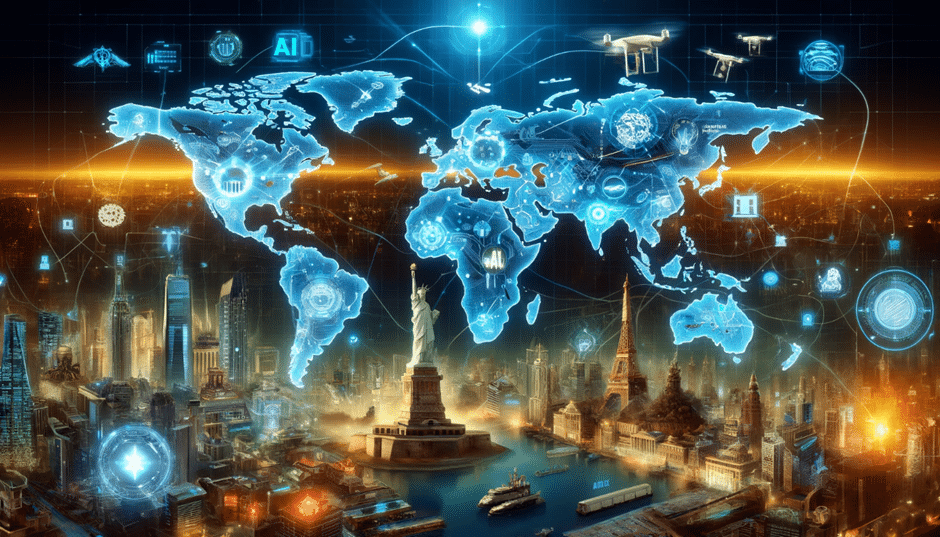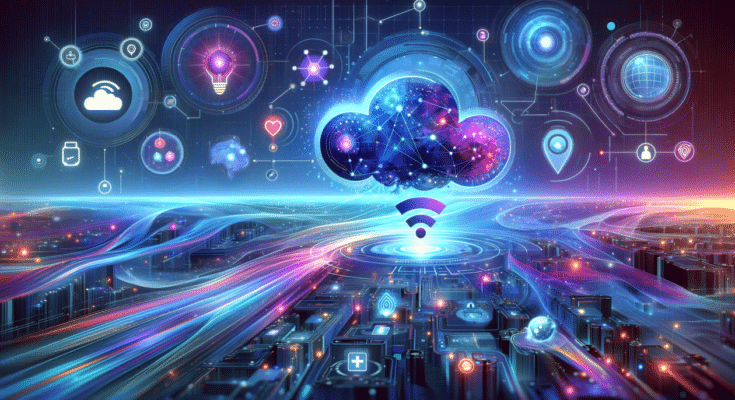AI And The Global Revolution Artificial Intelligence (AI) has emerged as one of the most transformative technologies of the 21st century, fundamentally altering the way we live, work, and interact. As we stand on the brink of a global revolution driven by AI, it is essential to understand how this technology is reshaping our world. From enhancing productivity and driving economic growth to addressing complex societal challenges, AI’s impact is profound and far-reaching. This article explores the various dimensions of AI innovation and its implications for the global landscape.
AI And The Global Revolution
Historical Context
The concept of artificial intelligence dates back to the mid-20th century when pioneers like Alan Turing and John McCarthy laid the groundwork for machine learning and cognitive computing. However, it wasn’t until recent advancements in computing power, data availability, and algorithmic sophistication that AI began to flourish. Today, AI encompasses a broad range of technologies, including machine learning, natural language processing, computer vision, and robotics.

Current State of AI Technology
AI technologies are now integrated into various sectors, including healthcare, finance, transportation, and manufacturing. Companies are leveraging AI to automate routine tasks, analyze vast datasets for actionable insights, and enhance decision-making processes. According to a report by PwC, AI could contribute an estimated $15.7 trillion to the global economy by 2030, highlighting its potential as a driving force for economic growth.
AI’s Impact on Global Economies
Economic Growth and Productivity
AI has the potential to significantly boost global economic activity. McKinsey & Company estimates that AI could add around $13 trillion to the global economy by 2030, representing a 16% increase in cumulative GDP compared to today. This growth will primarily stem from improvements in productivity across various industries as businesses adopt AI-driven solutions.
Sector-Specific Impacts
- Manufacturing: AI-powered automation is revolutionizing manufacturing processes by enhancing efficiency and reducing costs. Smart factories equipped with AI systems can optimize production schedules, monitor equipment health in real-time, and reduce waste.
- Healthcare: In healthcare, AI is transforming diagnostics and treatment plans. Machine learning algorithms can analyze medical images with remarkable accuracy, leading to earlier detection of diseases such as cancer. Additionally, AI-driven predictive analytics can help healthcare providers manage patient care more effectively.
- Finance: The financial sector is leveraging AI for fraud detection, risk assessment, and personalized customer service. Chatbots powered by natural language processing are improving customer interactions while machine learning algorithms are enhancing investment strategies.
- Transportation: Autonomous vehicles are one of the most visible applications of AI in transportation. Companies like Tesla and Waymo are pioneering self-driving technology that promises to reduce accidents and improve traffic flow.
Job Displacement vs. Job Creation
While AI holds immense potential for economic growth, it also raises concerns about job displacement. The International Monetary Fund (IMF) estimates that nearly 40% of jobs globally are exposed to automation through AI technologies. However, it is essential to recognize that while some jobs may be lost due to automation, many new roles will emerge as industries adapt to technological advancements.
The Need for Reskilling
As certain tasks become automated, there will be a growing demand for workers with skills in managing and interpreting AI systems. Reskilling initiatives will be crucial in preparing the workforce for the jobs of the future. Governments and educational institutions must collaborate with businesses to develop training programs that equip individuals with relevant skills.
The Geopolitical Landscape Shaped by AI

Global Competition for AI Leadership
As countries race to harness the power of AI, geopolitical dynamics are shifting. Nations that lead in AI development will likely gain significant economic advantages over their competitors. Countries like the United States and China are investing heavily in AI research and development to secure their positions as global leaders in technology.
National Security Implications
AI’s influence extends beyond economics; it also poses national security challenges. The integration of AI into military applications raises ethical concerns about autonomous weapons systems and decision-making processes in warfare. Countries must navigate these complexities while ensuring responsible use of AI technologies.
Addressing Global Inequality
While AI has the potential to drive economic growth, it also risks widening existing inequalities between countries and within societies. Developed nations with advanced technological infrastructure are better positioned to capitalize on AI innovations compared to developing countries with limited resources.
Bridging the Digital Divide
To address these disparities, international cooperation is essential. Initiatives aimed at bridging the digital divide—such as providing access to technology in underserved regions—can help ensure that all countries benefit from the advancements brought about by AI.
Ethical Considerations in AI Development
Bias and Fairness
As organizations increasingly rely on AI systems for decision-making processes—ranging from hiring practices to loan approvals—concerns about bias have come to the forefront. If not carefully managed, biases present in training data can lead to discriminatory outcomes that disproportionately affect marginalized groups.
Ensuring Transparency
To mitigate bias in AI systems, transparency is crucial. Organizations must adopt practices that promote accountability in their algorithms’ decision-making processes. This includes documenting data sources and methodologies used in training models while regularly auditing outcomes for fairness.
Privacy Concerns
The proliferation of AI technologies raises significant privacy concerns as vast amounts of personal data are collected for analysis. Striking a balance between leveraging data for innovation while safeguarding individual privacy rights is paramount.
Regulatory Frameworks
Governments must establish regulatory frameworks that protect citizens’ privacy without stifling innovation. Collaboration between policymakers and industry leaders can help create guidelines that promote ethical practices in data collection and usage.
The Future of Work in an AI-Driven World

Evolving Job Roles
As automation becomes more prevalent across industries, job roles will evolve rather than disappear entirely. Workers will increasingly collaborate with machines—leveraging their unique human capabilities alongside advanced technologies.
Emphasizing Creativity and Emotional Intelligence
Jobs requiring creativity, emotional intelligence, critical thinking, and interpersonal skills will become more valuable as these attributes cannot be easily replicated by machines. Education systems must adapt curricula to emphasize these skills alongside technical training.
Remote Work Opportunities
AI technologies also facilitate remote work arrangements by enabling seamless communication and collaboration among distributed teams. As organizations embrace hybrid work models post-pandemic, leveraging AI tools will be essential for maintaining productivity across geographically diverse teams.
Also Read : The Role Of Chatbots In Automating Social Media Marketing Campaigns
Conclusion: Embracing an AI-Driven Future
The advent of artificial intelligence marks a pivotal moment in human history—a time when technology has the potential to reshape our world fundamentally. While challenges exist—ranging from job displacement concerns to ethical dilemmas—the opportunities presented by AI innovations are immense.By embracing an inclusive approach that prioritizes reskilling initiatives, ethical considerations, and international cooperation, we can harness the full potential of artificial intelligence for the benefit of humanity as a whole. As we navigate this transformative era together—governments, businesses, educators, and individuals alike—we must remain vigilant stewards of technology’s impact on society while striving toward a future where innovation serves everyone equitably.
FAQs
1. What is the AI revolution?
The AI revolution refers to the rapid advancements in artificial intelligence technologies that are transforming various sectors and fundamentally changing how we live and work. It encompasses the integration of AI into everyday applications, business processes, and decision-making systems.
2. How is AI reshaping the global economy?
AI is reshaping the global economy by enhancing productivity, creating new markets, and driving innovation across industries. It is expected to contribute trillions of dollars to the global GDP by improving efficiency and enabling smarter decision-making.
3. What industries are most affected by AI?
AI is impacting a wide range of industries, including healthcare, finance, transportation, manufacturing, retail, and agriculture. Each sector is leveraging AI to optimize operations, improve customer experiences, and innovate products and services.
4. What are some examples of AI applications in everyday life?
Examples of AI applications in everyday life include virtual assistants like Siri and Alexa, recommendation systems on platforms like Netflix and Amazon, autonomous vehicles, smart home devices, and advanced customer service chatbots.
5. How does AI contribute to job displacement?
AI can lead to job displacement by automating tasks traditionally performed by humans. While some jobs may be lost due to automation, new roles requiring advanced skills in managing and interpreting AI systems are expected to emerge.
6. What skills will be in demand as AI continues to evolve?
As AI technology advances, skills in data analysis, machine learning, programming, critical thinking, problem-solving, and emotional intelligence will be increasingly valuable. Reskilling initiatives will be essential to prepare the workforce for these new demands.
7. How can businesses effectively implement AI technologies?
Businesses can effectively implement AI technologies by identifying specific use cases that align with their goals, investing in the necessary infrastructure and talent, fostering a culture of innovation, and continuously evaluating performance outcomes.

